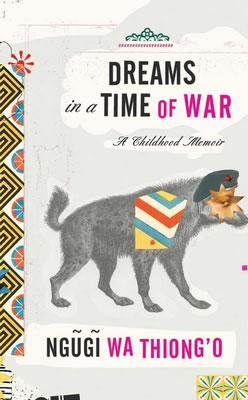 The works of the Kenyan author Ngugi wa Thiong'o have intrigued me for a while because, for the past thirty-plus years, he has chosen to write them in Gikiyu, an African language, rather than in English. Gikiyu being his first language, he believes that it is more appropriate for his writing and for African literature. He views English as a colonizers' language that has been imposed on him. (He and Chinua Achebe disagree on this.) However, NwT is his own translator, which solves some of the problems of transmission. (Note that Joseph Conrad, on the other hand, chose to write in English, rather than in Polish, and that he did not translate his own works into his first language.)
The works of the Kenyan author Ngugi wa Thiong'o have intrigued me for a while because, for the past thirty-plus years, he has chosen to write them in Gikiyu, an African language, rather than in English. Gikiyu being his first language, he believes that it is more appropriate for his writing and for African literature. He views English as a colonizers' language that has been imposed on him. (He and Chinua Achebe disagree on this.) However, NwT is his own translator, which solves some of the problems of transmission. (Note that Joseph Conrad, on the other hand, chose to write in English, rather than in Polish, and that he did not translate his own works into his first language.)This article from the Global Literacy Project's web site discusses NwT's thoughts on the relationship between language and literature.
http://www.glpinc.org/Classroom%20Activities/Kenya%20Articles/Ngugi%20Wa%20Thiong%27o-On%20Language%20and%20Culture.htm
This article is more extensive and mentions his approach to each language:
http://www.nondomesticatedthinker.com/2010/04/dialogue-among-african-languages-by-ngugi-wa-thiong%E2%80%99o/
Here is a brief biography from 1996:
http://www.english.emory.edu/Bahri/Ngugi.html
This biography dates from 2001:
http://www.humanities.uci.edu/icwt/news/ngugi_bio.html
Since 2001, NwT has returned to Kenya where he and his wife suffered a vicious attack:
http://www.guardian.co.uk/books/2006/jan/28/featuresreviews.guardianreview13
Below are some maps that will help you place Kenya.

 Below is a picture of a woman picking tea in Limuru, NwT's hometown. I was surprised to see that it was less than twenty miles from Nairobi, Kenya's capital.
Below is a picture of a woman picking tea in Limuru, NwT's hometown. I was surprised to see that it was less than twenty miles from Nairobi, Kenya's capital.  This summer I was able to read NwT's novel, Petals of Blood. This book is the last one he composed in English. It is set in Ilmorog, a fictional Kenyan village that becomes a boomtown over the course of the novel. Events take place during the late 1960s and early 1970s, after Kenya becomes independent. Ostensibly, the story is something of a murder mystery as at the beginning, three wealthy men have been killed in a fire. However, NwT's narrative focuses more on the paths that four friends take over the course of a dozen years. These friends are Munira, a teacher from a wealthy family; Wanja, a businesswoman who becomes the madam of a brothel; Abdulla, Wanja's former partner; and Karega, a union organizer whom she once loved. Each man is a suspect in the deaths of the three wealthy men, and each of the wealthy men was involved with Wanja. (The fire occurred at her mansion.) Interestingly, NwT finished up this novel in 1977 at a Soviet writers' colony. (The USSR hadn't yet fallen.)
This summer I was able to read NwT's novel, Petals of Blood. This book is the last one he composed in English. It is set in Ilmorog, a fictional Kenyan village that becomes a boomtown over the course of the novel. Events take place during the late 1960s and early 1970s, after Kenya becomes independent. Ostensibly, the story is something of a murder mystery as at the beginning, three wealthy men have been killed in a fire. However, NwT's narrative focuses more on the paths that four friends take over the course of a dozen years. These friends are Munira, a teacher from a wealthy family; Wanja, a businesswoman who becomes the madam of a brothel; Abdulla, Wanja's former partner; and Karega, a union organizer whom she once loved. Each man is a suspect in the deaths of the three wealthy men, and each of the wealthy men was involved with Wanja. (The fire occurred at her mansion.) Interestingly, NwT finished up this novel in 1977 at a Soviet writers' colony. (The USSR hadn't yet fallen.)
NwT's next novel, Devil on the Cross, is also set in Ilmorog. This novel, on the other hand, was written in a Kenyan prison and is the author's first novel in Gikiyu.

I am also reading NwT's recent memoir, Dreams in a Time of War, which was published this year (2010). It's always interesting to learn more about an author's background since he or she often draws on it for his/her fiction. Unsurprisingly, NwT grew up in a village, and members of his working-class family were involved in 20th c. struggles against the British. (Kenya was a British colony until 1963.) His older brother, Good Wallace, belonged to the Mau Maus, a group that actively fought the British. Like one of the minor characters in Petals of Blood, he was betrayed, but the ending of his story appears to be happier. Like Joseph, Abdulla's adopted son, NwT won a scholarship to an elite high school in Kenya. The memoir ends with his arrival at this school after some surprising twists and turns.

No comments:
Post a Comment